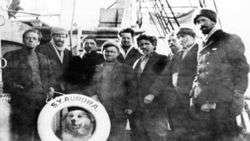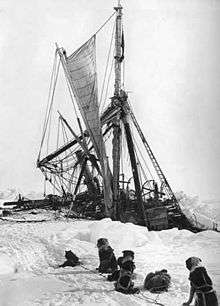Ernest Wild

Henry Ernest Wild AM (10 August 1879 – 10 March 1918), known as Ernest Wild, was a British Royal Naval seaman and Antarctic explorer, a younger brother of Frank Wild. Unlike his more renowned brother, who went south on five occasions, Ernest Wild made only a single trip to the Antarctic, as a member of the Ross Sea party in support of Sir Ernest Shackleton's Imperial Trans-Antarctic Expedition, 1914–17. He was one of the group of ten who were stranded ashore when the expedition's ship was blown from its moorings in a gale and were forced to improvise in order to survive. He played a full part in the party's main depot-laying journey, 1915–16, and in recognition of his efforts to save the lives of two comrades on that journey, he was posthumously awarded the Albert Medal. Having survived the expedition, he died while on active service with the Royal Navy in the Mediterranean Sea in March 1918.
Early life
Ernest Wild was one of eight brothers[1] of whom Frank was the eldest. The family came from Skelton, North Yorkshire, close to Marton, birthplace of Captain James Cook, to whom the family claimed relationship, Mrs Wild having been born Mary Cook,[1] but no positive connection has been established. Ernest followed Frank into the Navy in 1894 and remained in service for 20 years before joining the Ross Sea party.
Ross Sea party, 1914–17
Wild sailed to Antarctica on SY Aurora in December 1914, under the command of Captain Aeneas Mackintosh. Among the expedition's members was Ernest Joyce, the only member of the party with significant experience of Antarctic conditions.[2] The party's mission was to lay depots on the Great Ice Barrier, to support a group led by Shackleton which would be crossing the continent from the Weddell Sea. The Ross Sea party's base was established at Cape Evans in McMurdo Sound, and the expedition ship Aurora was anchored there.
After participating in the first season's hasty depot-laying journey in January–March 1915, Wild suffered severe frostbite resulting in the amputation of part of a toe and the top of an ear.[3] On 7 May 1915 Aurora, still holding most of the shore party's equipment and stores, was blown out to sea during a gale and was unable to return.[4] Subsequently, Wild and Ernest Joyce showed considerable resourcefulness in fabricating clothes and equipment from materials left over from Scott's Terra Nova expedition (which had used this base 1910–13).[5] As a morale booster, for the diehard smokers in the party Wild concocted a mixture ("Hut Point Mixture") of tea, coffee, sawdust, sennegrass and dried herbs.[6] In the straitened circumstances in which he party found itself Wild was a universally popular figure – "a cheerful, willing soul" according to Mackintosh.[7]
On the 1915–16 depot-laying journey two three-man teams made the long march from "Rocky Mountain depot" at 80°S to the foot of the Beardmore Glacier. Wild was initially teamed with Mackintosh and Arnold Spencer-Smith, the party's Chaplain and photographer. Ernest Joyce, Richard W Richards and Victor Hayward formed the other team. As the two parties moved south, conditions worsened and the men's physical condition weakened. Eventually the two groups combined into a single unit. Close to the glacier Spencer-Smith collapsed, and thereafter had to be carried on the sledge.[8] After the last depot had been laid Mackintosh became lame and unable to pull, and the entire team, including Wild, developed scurvy. The stricken party, having fulfilled all its depot-laying duties, struggled back towards its base in awful weather, Wild nursing Spencer-Smith who had become helpless. He died before the base was reached.[9] The remaining five reached the safety of Hut Point and slowly recovered their strength. On 8 May 1916 Mackintosh and Hayward risked walking on the sea ice in an attempt to reach Cape Evans,but disappeared during a blizzard and were never seen again.[10] Wild and the other survivors were rescued in January 1917.
Afterwards
In 1917 Wild returned to naval duty on HMS Pembroke, later transferring to HMS Biarritz. He died on 10 March 1918[11] in the Royal Naval Hospital, Malta, after contracting typhoid.[11] He is buried in the Commonwealth War Grave Commission's plot in Malta (Capuccini) Naval Cemetery.[12] In 1923 he was posthumously awarded the Albert Medal for his efforts to save the lives of Mackintosh and Spencer-Smith.[13] An unassuming man, he published no diaries or records of his Antarctic experiences. Alexander Stevens, who had been chief scientist on the Ross Sea party, paid him this tribute: "There are some things that have great value but no glitter. Consistent...long-suffering, patient, industrious, good-humoured, unswervingly loyal, he made an enormous contribution to our well-being".[14]
Notes and references
- 1 2 Bickel p27
- ↑ He had been a member of Captain Scott's Discovery Expedition, 1901–04 and Shackleton's Nimrod Expedition, 1907–09.
- ↑ Fisher, P401
- ↑ Tyler-Lewis, p. 128
- ↑ Tyler-Lewis, p. 137
- ↑ Tyler-Lewis, p. 138
- ↑ Tyler-Lewis, p. 140
- ↑ Bickel, p. 129
- ↑ Bickel, p. 189
- ↑ Bickel, pp. 210–13
- 1 2 Tyler-Lewis, p. 267
- ↑ http://www.cwgc.org/find-war-dead/casualty/116688/WILD,%20H%20E
- ↑ Tyler-Lewis, p. 258
- ↑ Huntford, p. 452, quoting from A.O.Stevens:Report of the Ross Sea Party
Sources
- Bickel, Lennard: Shackleton's Lost Men Random House, London 2001 ISBN 0-7126-6807-1
- Fisher:, M and J: Shackleton James Barrie Books, London 1957
- Huntford, Roland: Shackleton Hodder & Stoughton, London 1985 ISBN 0-340-25007-0
- Tyler-Lewis, Kelly: The Lost Men Bloomsbury Publications, London 2007 ISBN 978-0-7475-7972-4
